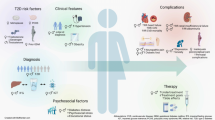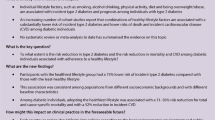Abstract
Background: Literature data examining the role of metabolic syndrome and its components in prostate cancer risk are limited and contradictory. Aim: We did a meta-analysis of studies that evaluated the association between metabolic syndrome, its components, and risk of prostate cancer. Subjects and methods: We conducted an electronic search for articles published through September 2012 without restrictions. Every included study was to report risk estimates with 95% confidence intervals for the association between metabolic syndrome and prostate cancer. Results: The final number of papers included in the meta-analysis was 14, all published in English, with 4728 prostate cancer cases. Metabolic syndrome was associated with a 12% increase in prostate cancer risk (p=0.231), that was lower in cohort studies (7 studies, RR=1.04, p=0.791) than other studies (RR=1.23, p=0.125). The association was significant in the 8 European studies (RR=1.30, p=0.034), but not in the 4 U.S. or 2 Asiatic studies. The risk estimates of prostate cancer for higher values of body mass index, dysglycemia or dyslipidemia (high triglycerides, low HDL-cholesterol) were not significant; on the contrary, hypertension and waist circumference >102 cm were associated with a significant 15% (p=0.035) and 56% (p=0.007) greater risk of prostate cancer, respectively. Conclusions: Metabolic syndrome is weakly and non significantly associated with prostate cancer risk, but associations vary with geography. Among single components of the syndrome, hypertension and higher waist circumference are significantly associated with increased risk of prostate cancer.
Similar content being viewed by others
References
Siegel R, Naishadham D, Jemal A. Cancer statistics, 2012. CA Cancer J Clin 2012, 62: 10–29.
OECD. Health at a Glance 2011: OECD Indicators. Paris: OECD Publishing, 2011.
Hsing AW, Chokkalingam AP. Prostate cancer epidemiology. Front Biosci 2006, 11: 1388–413.
Hsing AW, Devesa SS. Trends and patterns of prostate cancer: what do they suggest? Epidemiol Rev 2001, 23: 3–13.
Alberti KGMM, Eckel RH, Grundy SM, et al; International Diabetes Federation Task Force on Epidemiology and Prevention; National Heart, Lung, and Blood Institute; American Heart Association; World Heart Federation; International Atherosclerosis Society; International Association for the Study of Obesity. Harmonizing the metabolic syndrome: a joint interim statement of the International Diabetes Federation Task Force on Epidemiology and Prevention; National Heart, Lung, and Blood Institute; American Heart Association; World Heart Federation; International Atherosclerosis Society; and International Association for the Study of Obesity. Circulation 2009, 120: 1640–5.
Hsing AW, Sakoda LC, Chua SC. Obesity, metabolic syndrome, and prostate cancer. Am J Clin Nutr 2007, 86: s843–57.
Esposito K, Chiodini P, Colao A, Lenzi A, Giugliano D. Metabolic syndrome and risk of cancer. Diabetes Care 2012, 35: 2402–11.
Bonovas S, Filioussi K, Tsantes A. Diabetes mellitus and risk of prostate cancer: a meta-analysis. Diabetologia 2004, 47: 1071–8.
Liberati A, Altman DG, Tetzlaff J, et al. The PRISMA statement for reporting systematic reviews and meta-analyses of studies that evaluate health care interventions: explanation and elaboration. Ann Intern Med 2009, 151: W65–94.
Higgins JP, Thompson SG. Quantifying heterogeneity in a metaanalysis. Stat Med 2002, 21: 1539–58.
Tobias A. Assessing the influence of a single study in the metaanalysis estimate. Stata Tech Bull 1999, 8: 15–7.
Egger M, Davey Smith G, Schneider M, Minder C. Bias in meta-analysis detected by a simple, graphical test. BMJ 1997, 315: 629–34.
Laukkanen JA, Laaksonen DE, Niskanen L, Pukkala E, Hakkarainen A, Salonen JT. Metabolic syndrome and the risk of prostate cancer in Finnish men: A population-based study. Cancer Epidemiol Biomarkers Prev 2004, 13: 1646–50.
Lund Håheim L, Wisløff TF, Holme I, Nafstad P. Metabolic syndrome predicts prostate cancer in a cohort of middle-aged Norwegian men followed for 27 years. Am J Epidemiol 2006, 164: 769–74.
Tande AJ, Platz EA, Folsom AR. The metabolic syndrome Is associated with reduced risk of prostate cancer. Am J Epidemiol 2006, 164: 1094–102.
Inoue M, Noda M, Kurahashi N, et al; Japan Public Health Center-based Prospective Study Group. Impact of metabolic factors on subsequent cancer risk: results from a large-scale population-based cohort study in Japan. Eur J Cancer Prev 2009, 18: 240–7.
Martin RM, Vatten L, Gunnell D, Romundstad P, Nilsen TI. Components of the metabolic syndrome and risk of prostate cancer: the HUNT 2 cohort, Norway. Cancer Causes Control 2009, 20: 1181–92.
Wallner LP, Morgenstern H, McGree ME, et al. The effects of metabolic conditions on prostate cancer incidence over 15 years of follow-up: results from the Olmsted County Study. BJU Int 2010, 107: 929–35.
Grundmark B, Garmo H, Loda M, Busch C, Holmberg L, Zethelius B. The metabolic syndrome and the risk of prostate cancer under competing risks of death from other causes. Cancer Epidemiol Biomarkers Prev 2010, 19: 2088–96.
Beebe-Dimmer JL, Dunn RL, Sarma AV, Montie JE, Cooney KA. Features of the metabolic syndrome and prostate cancer in African-American men. Cancer 2007, 109: 875–81.
Tuohimaa P, Tenkanen L, Syvälä H, et al. Interaction of factors related to the metabolic syndrome and vitamin D on risk of prostate cancer. Cancer Epidemiol Biomarkers Prev 2007, 16: 302–7.
Russo A, Autelitano M, Bisanti L. Metabolic syndrome and cancer risk. Eur J Cancer 2008, 44: 293–7.
Beebe-Dimmer JL, Nock NL, Neslund-Dudas C, et al. Racial differences in risk of prostate cancer associated with metabolic syndrome. Urology 2009, 74: 185–90.
Pelucchi C, Serraino D, Negri E, et al. The metabolic syndrome and risk of prostate cancer in Italy. Ann Epidemiol 2011, 21: 835–41.
De Nunzio C, Freedland SJ, Miano R, et al. Metabolic syndrome Is associated with high grade Gleason score when prostate cancer is diagnosed on biopsy. Prostate 2011, 71: 1492–8.
Osaki Y, Taniguchi S-I, Tahara A, Okamoto M, Kishimoto T. Metabolic syndrome and incidence of liver and breast cancers in Japan. Cancer Epidemiol 2012, 36: 141–7.
Rodriguez C, Patel AV, Mondul AM, Jacobs EJ, Thun MJ, Calle EE. Diabetes and risk of prostate cancer in a prospective cohort of US men. Am J Epidemiol 2005, 161: 147–52.
Kasper JS, Giovannucci E. Meta-analysis of diabetes mellitus and risk of prostate cancer. Cancer Epidemiol Biomarkers Prev 2006, 15: 2056–62.
Renehan AG, Tyson M, Egger M, Heller RF, Zwahlen M. Body-mass index and incidence of cancer: a systematic review and meta-analysis of prospective observational studies. Lancet 2008, 371: 569–78.
MacInnis RJ, English DR. Body size and composition and prostate cancer risk: systematic review and meta-regression analysis. Cancer Causes Control 2006, 17: 989–1003.
Wallström P, Bjartell A, Gullberg B, Olsson H, Wirfält E. A prospective Swedish study on body size, body composition, diabetes, and prostate cancer risk. Br J Cancer 2009, 100: 1799–805.
Jackson MD, Walker SP, Simpson CM, et al. Body size and risk of prostate cancer in Jamaican men. Cancer Causes Control 2010, 21: 909–17.
De Nunzio C, Albisinni S, Freedland SJ, et al. Abdominal obesity as risk factor for prostate cancer diagnosis and high grade disease: A prospective multicenter Italian cohort study. Urol Oncol 2011 Sep 16 [Epub ahead of print]; doi: 10.1016/j.urolonc.2011.08.007
Nemesure B, Wu SY, Hennis A, Leske MC; Prostate Cancer in a Black Population (PCBP) Study Group. Central adiposity and Prostate Cancer in a Black Population. Cancer Epidemiol Biomarkers Prev 2012, 21: 851–8.
Pischon T, Boeing H, Weikert S, et al. Body size and risk of prostate cancer in the European prospective investigation intocancer and nutrition. Cancer Epidemiol Biomarkers Prev 2008, 17: 3252–61.
Nomura AM. Body size and prostate cancer. Epidemiol Rev 2001, 23: 126–31.
Wolk A, Mantzoros CS, Andersson SO, et al. Insulin-like growth factor 1 and prostate cancer risk: a population-based, case-control study. J Natl Cancer Inst 1998, 90: 911–5.
Moyad MA. Is obesity a risk factor for prostate cancer, and does it even matter? A hypothesis and different perspective. Urology 2002, 59(Suppl 1): 41–50.
Ulmer H, Borena W, Rapp K, et al. Serum triglyceride concentrations and cancer risk in a large cohort study in Austria. Br J Cancer 2009, 101: 1202–6.
Van Hemelrijck M, Garmo H, Holmberg L, et al. Prostate cancer risk in the Swedish AMORIS study: the interplay among triglycerides, total cholesterol, and glucose. Cancer 2011, 117: 2086–95.
Martin RM, Vatten L, Gunnell D, Romundstad P, Nilsen TI. Components of the metabolic syndrome and risk of prostate cancer: the HUNT 2 cohort, Norway. Cancer Causes Control 2009, 20: 1181–92.
Mondul AM, Weinstein SJ, Virtamo J, Albanes D. Serum total and HDL cholesterol and risk of prostate cancer. Cancer Causes Control 2011, 22: 1545–52.
Kok DE, van Roermund JG, Aben KK, et al. Blood lipid levels and prostate cancer risk; a cohort study. Prostate Cancer Prostatic Dis 2011, 14: 340–5.
Jacobs EJ, Stevens VL, Newton CC, Gapstur SM. Plasma total, LDL, and HDL cholesterol and risk of aggressive prostate cancer in the Cancer Prevention Study II Nutrition Cohort. Cancer Causes Control 2012, 23: 1289–96.
Jaggers JR, Sui X, Hooker SP, et al. Metabolic syndrome and risk of cancer mortality in men. Eur J Cancer 2009, 45: 1831–8.
Morote J, Ropero J, Planas J, et al. Metabolic syndrome increases the risk of aggressive prostate cancer detection. BJU Int 2012, Aug 9 [Epub ahead of print]. doi: 10.1111/j.1464-410X.2012.11406.x.
Kheterpal E, Sammon JD, Diaz M, et al. Effect of metabolic syndrome on pathologic features of prostate cancer. Urol Oncol 2012, Sep 25 [Epub ahead of print]; doi 10.1016/j.urolonc.2011.12.012
Esposito K, Giugliano D. Obesity, the metabolic syndrome, and sexual dysfunction in men. Clin Pharmacol Ther 2011, 90: 169–73.
Corona G, Baldi E, Maggi M. Androgen regulation of prostate cancer: where are we now? J Endocrinol Invest 2011, 34: 232–43.
Jannini EA, Gravina GL, Mortengaler A, Morales A, Incocci L, Hellstrom WJG. Is testosterone a friend or a foe of the prostate? J Sex Med 2011, 8: 946–55.
Author information
Authors and Affiliations
Corresponding author
Rights and permissions
About this article
Cite this article
Esposito, K., Chiodini, P., Capuano, A. et al. Effect of metabolic syndrome and its components on prostate cancer risk: Meta-analysis. J Endocrinol Invest 36, 132–139 (2013). https://doi.org/10.1007/BF03346748
Accepted:
Published:
Issue Date:
DOI: https://doi.org/10.1007/BF03346748




